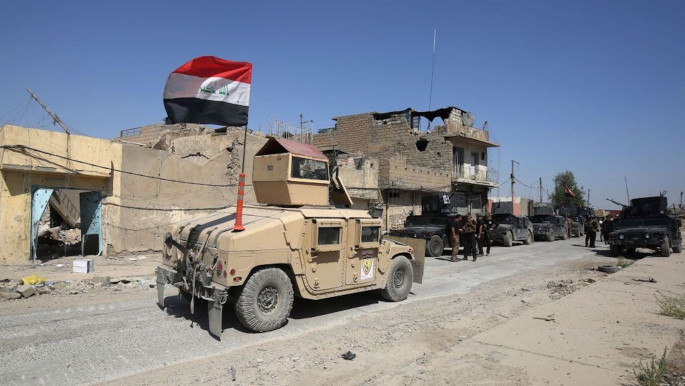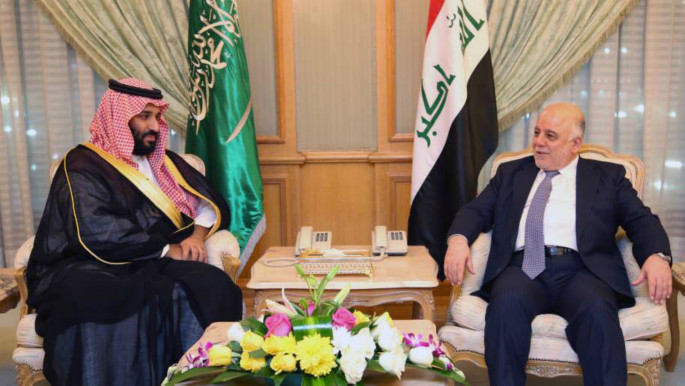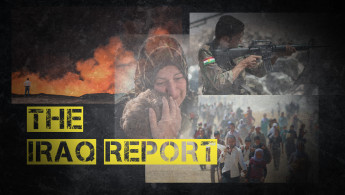The Iraq Report: Iraq becomes a vehicle for Iranian power
Click here to receive The Iraq Report each week in your inbox
The Iraqi military has begun to take what appear to be the final steps in the operation to retake Mosul - a clash that has now lasted even longer than the infamous Second World War urban battle of Stalingrad. However, the Mosul front against the Islamic State group is being rivalled in its prominence by an Iranian-led push to connect proxy forces pushing towards each other from Iraqi and Syrian battlefields.
Iranian ambitions do not only extend to influence in the spheres of security and politics, but also social influence, as Iran attempts to shape Iraq’s disparate ethno-sectarian communities into a malleable proxy to further its own regional ambitions and agenda.
Final Mosul push begins
Iraqi forces launched the final push to oust the Islamic State group from Mosul on Sunday, and began to breach IS positions in Mosul’s historic Old City district. Lieutenant General Abdulwahhab al-Saadi, a senior commander with the elite Counter Terrorism Service (CTS), announced that the assault on the Old City began with US-led coalition airstrikes shortly after midnight, before ground units began moving in to engage softened IS targets.
Alongside the CTS – which was the unit that spearheaded the operation in October– units from the Iraqi army and Federal Police are also involved. Alongside alleged US use of white phosphorus munitions in built-up areas packed with approximately 200,000 civilians, the presence of the Federal Police has raised concerns of potential abuses against those civilians who have spent the longest period of time trapped under the rule of IS.
A recent scandal blowing up in May revealed that the Federal Police, infiltrated by Shia militants, had been behind a string of gruesome atrocities in and around Mosul. Special forces units linked to the Federal Police were also found to have been involved in the torture, rape and murder of non-combatants, especially among the predominantly Sunni Arab residents of Mosul.
Now that the operation has entered its ninth month, it is still unclear if Iraqi forces will be able to defeat IS in Mosul before the third anniversary of Abu Bakr al-Baghdadi’s “caliphate”, as declared from the Grand Nuri Mosque on 29 June 2014. Once the battle finally ends, the next stages of stabilisation and reform to prevent a reoccurrence of the IS nightmare will be just as important as the fight against IS itself.
 |
| The battle for Mosul is nearing its final stages [AFP - June 21] |
Mosul’s civilians face new challenges
While Iraqi forces do battle with IS extremists in Mosul’s Old City, the recaptured areas of Iraq’s second city face fresh challenges. Although life has begun to slowly return to neighbourhoods cleared of IS fighters as some refugees return to their city, the trail of devastation left by the fighting has crippled hopes for a return to any real sense of normality.
The fighting itself has not ended fully, as IS has managed to conduct counterattacks inside areas supposedly cleared by Iraqi forces. Last Thursday, militants managed to launch a surprise attack in the Dawasa and Nabi Sheet neighbourhoods, killing about a dozen Federal Police officers as well as five civilians, demonstrating that the IS threat is far from over.
In a sign of panic against attacks by IS operatives, the Iraqi authorities took the highly controversial decision of banning women from wearing the niqab, a full-face veil worn by some Muslim women. Although a conservative society, the niqab is not customarily worn by women in Mosul. However, the move has been criticised by some as infringing on women’s rights, while Iraqi forces insist that it is a safety measure after IS militants were allegedly caught trying to infiltrate areas by pretending to be women.
In a positive development, students have started to sit exams for the first time in three years of extremist rule. Students at the University of Mosul were finally able to continue their academic journeys after a three-year hiatus following the IS conquest of the city. Harkening back to medieval attacks against literature, the militants also torched the university library, destroying thousands of books and rare manuscripts in what has been widely condemned as a crime against culture and education.
 |
Collective punishment is not new in Iraq, as entire villages and towns – such as Jurf al-Sakhr in central Iraq – have been depopulated by the Iraqi security forces and PMF militants |  |
IS as an excuse to repress Sunni Arabs
Al Jazeera reported on Tuesday that the Mosul District Council had issued a deportation order against family members of alleged IS militants. According to reports, Iraqi authorities intend to open up new “rehabilitation” camps outside the city limits where family members will be held to determine whether or not they are extremists.
Collective punishment is not new in Iraq, as entire villages and towns – such as Jurf al-Sakhr in central Iraq – have been depopulated by the Iraqi security forces and PMF militants. Not only were the Sunni Arab inhabitants of Jurf al-Sakhr prevented from returning to their homes, displacing them since late 2014, but their town was renamed by authorities as “Jurf al-Nasr”, using the Arabic word for victory.
This is offensive to many Sunni Arabs from the district, as they were one of the first towns to participate in the US-funded war against al-Qaeda in Iraq in 2007, and played an instrumental role in reducing violence in the surrounding area.
Many relatives of militants feel that they are being unfairly demonised, while other families in Diyala governorate who were also prevented from returning home last year complained that IS was being used as a justification by the authorities and PMF fighters to act against the local Sunni Arab population, dispossessing them and breaching their human rights without fair access to adjudication or due process.
Iraq’s Sunni community came under further attack on Monday after Iran-backed political efforts began attempting to create a new Sunni religious authority to reduce the influence of the traditional Sunni scholarly class. Sunni scholars are often seen as dissidents against the Shia-dominated government’s policies, which are often perceived to be discriminatory in nature, and this latest attempt to create a “government-friendly” Sunni religious authority will likely further enflame tensions.
Iran merges the Iraqi and Syrian conflicts
The fighting playing out in Mosul, however, appears to be taking less and less prominence as Iranian-backed Shia Islamist militants continue their drive to gain full control over the Iraqi-Syrian border. Shia fighters from the Popular Mobilisation Forces (PMF), or Hashd al-Sha’abi in Arabic, managed to capture al-Ba’aj near the Syrian border last week, while Iraqi forces took the Al-Waleed border crossing with Syria on Saturday.
According to The Guardian, these moves by the Iraqis have been spearheaded by Qassem Soleimani , an infamous Iranian general, who is the commander of the Islamic Revolutionary Guard Corps’ elite Quds Force. Along with Syrian Shia militants, the Syrian regime’s army has also made a push towards their side of the border after outflanking US-backed forces at al-Tanf. This appears to be an attempt by Syrian forces to push east and Iraqi forces pushing west to link up their efforts, under the overall command of Soleimani.
Graffiti in al-Ba’aj seen by The Guardian shows Shia militias expressing their appreciation to Soleimani and Iran, with banners of Iranian Supreme Leader Ayatollah Ali Khamenei appearing in the Iraqi town. Iran appears to be slowly transforming the PMF into perhaps the most powerful of its many proxies in Iraq, with the country itself becoming a vehicle for Iranian regional ambitions as the PMF takes over IS businesses, including, allegedly, oil-smuggling criminal enterprises to increase its sources of revenue.
The PMF has stated that it will be remaining in al-Ba’aj, despite the town being largely Sunni, and that the town will be transformed into a key location on a new route being established by the Iranians that will allow Tehran to supply and move men and materiel from Iran into Iraq, and then onwards onto Syria before finally connecting them to Lebanon. Such an ambitious plan, dubbed a “Shia Crescent” of influence, has long been on the cards for the Iranian leadership, and will go a long way to establishing Tehran’s dominance and influence.
 |
| Abadi in Saudi Arabia [Getty] |
Iraqi prime minister in regional tour
Iran’s influence over the PMF and Shia Islamist political parties – including the ruling Dawa Party – notwithstanding, Iraqi Prime Minister Haider al-Abadi arrived in Tehran on Tuesday after first visiting Saudi Arabia in a regional tour meant to reinvigorate ties frayed by years of sectarian tension.
Before setting out on his diplomatic offensive, Abadi made a pointed reference to the ongoing Saudi-UAE-led blockade against Qatar, saying that Iraq would not get involved in regional disputes and would adopt a position of non-interference in its neighbours’ affairs. Instead, the Iraqi premier was keen on discussing Saudi citizens travelling to Iraq to fight alongside extremist groups such as IS, as well as to discuss oil exports and their effect on prices.
The meeting was hailed as a success by both parties, saying that they had achieved a “qualitative leap” in relations, though details of what was agreed remained sketchy. It was not immediately clear whether Saudi Arabia would appoint a new ambassador to Baghdad, after the previous ambassador left after he criticised the PMF and Shia Islamist groups.
Saudi Arabia’s policy toward Iraq remains largely a mystery, as Riyadh has taken seemingly very few steps against Iraqi groups that have directly threatened it. The Baghdad-sanctioned PMF commander Abu Mahdi al-Muhandis – who receives financial backing from the government – recently even threatened to invade the Saudi capital.
Furthermore, Iraqi and Syrian groups appear to have begun military cooperation under the coordination of Iran, in a conflict where Riyadh openly backs rebels against the Assad regime. Yet a positive end to discussions between Saudi Arabia and Iraq appears to suggest that these sensitive topics were likely avoided, perhaps as Riyadh awaits the outcome of Abadi’s meeting with Iranian officials.
The Iraq report is a new weekly feature at The New Arab.
Click here to receive The Iraq Report each week in your inbox



